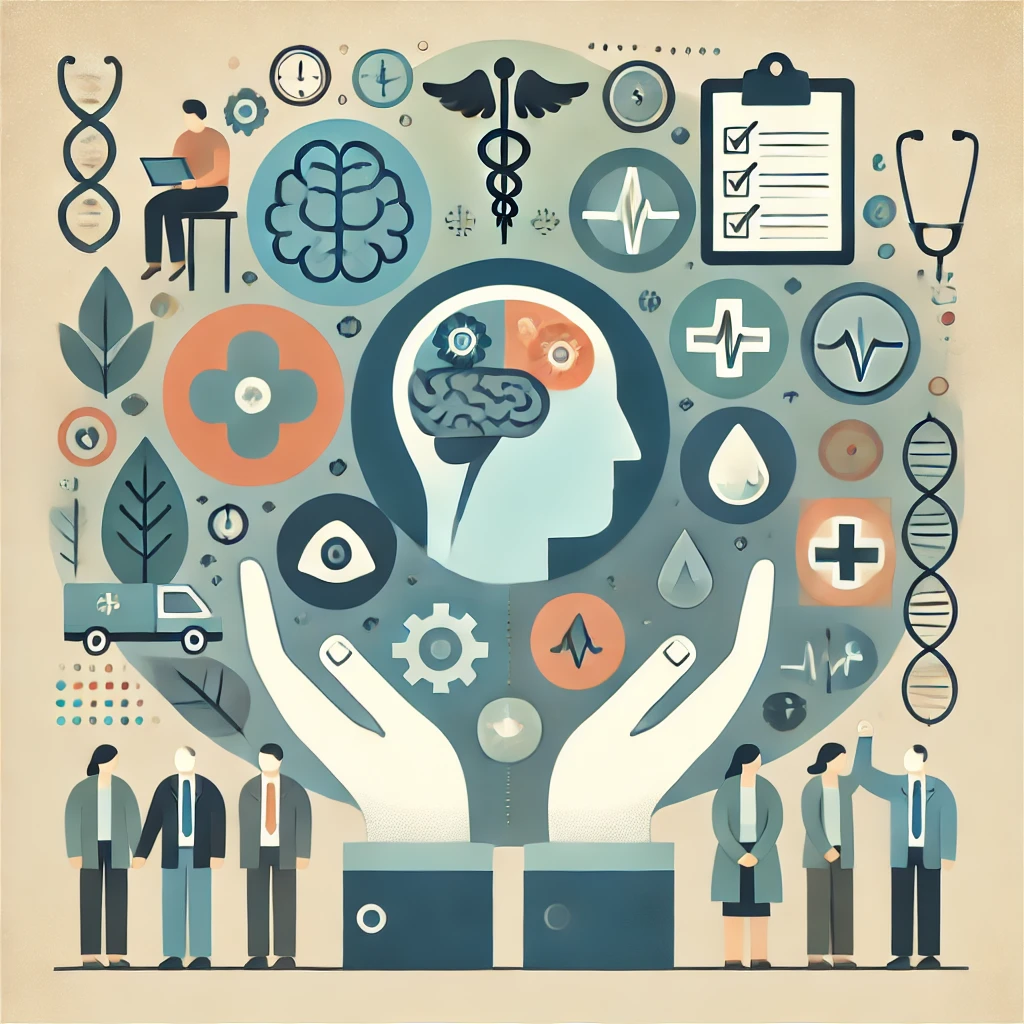The Mental Health Webinar 2025 hosted by eMedEd and eMedEvents brought together mental health professionals and enthusiasts from around the globe in an event designed to explore current strategies in managing common psychiatric conditions. This event provided cutting-edge knowledge sharing on some of today’s pressing challenges in psychiatric care; additionally it focused on effective management strategies with groundbreaking perspectives to support professionals across mental health sectors.
A New Era in Mental Health Care
As mental health awareness continues to expand, demand for up-to-date, evidence-based care continues to increase. This year’s Mental Health Webinar addressed these evolving needs by offering innovative strategies and the latest research findings, while simultaneously reinforcing key fundamentals like mood disorders, anxiety and managing complex conditions like PTSD or schizophrenia – providing attendees with invaluable information across a range of mental health concerns.
Key Takeaways from the Webinar
Personalized Treatment Approaches
- Personalized Treatment Approaches
This event highlighted the need for tailoring treatment plans specifically to individual patient backgrounds and symptoms, rather than following a one-size-fits-all model that often fails. Personalized solutions tailored to specific patient requirements have shown great promise in improving outcomes for patient.
Integrative and Holistic Care
Beyond traditional therapeutic approaches, integrative and holistic care that encompasses lifestyle changes, nutritional assistance, mindfulness practices and other complementary therapies is becoming more mainstream. Such approaches help treat the “whole person,” acknowledging the correlation between mind and body. Many speakers showcased case studies where holistic approaches helped sustain long-term recovery efforts. - The Role of Technology in Mental Health
Technology’s role in psychiatry is evolving quickly. From AI-powered diagnostic tools to telepsychiatry platforms, tech solutions are helping professionals reach and support more patients than ever. This webinar showcased some innovative tech solutions which improve access, accuracy, and quality of care. - Trauma-Informed Care in Mental Health Settings This event focused on trauma-informed care, an approach which emphasizes understanding and responding to the effects of trauma. This method can be instrumental when treating patients suffering from PTSD, anxiety and depression as it helps create a safe space for healing while limiting further traumatization.
- Strategies for Managing Medication Side Effects
Successful psychiatric care often necessitates finding an ideal balance between treatment efficacy and managing side effects. The presenters shared updated guidelines and new research related to managing side effects in order to help clinicians refine their medication strategies and increase patient adherence.
Collaboration and Ongoing Education
Mental Health Webinar 2025 emphasizes the significance of collaboration in mental health care. With knowledge and technology continuously changing, mental health practitioners require ongoing education in order to keep up with best practices in patient care. Webinars such as this one not only foster collaboration among practitioners but also facilitate enhanced patient outcomes.
Looking Ahead: The Future of Psychiatric Care
The Mental Health Webinar 2025 has set the stage for a promising future in psychiatric care, emphasizing evidence-based, holistic, and patient-centric treatment methods. As professionals across all fields embrace these advances, we can achieve more effective, compassionate, and accessible mental health care services; by remaining committed to innovation and collaboration we move closer towards creating a world in which mental health care empowers its users.
Technology’s Transformative Role in Mental Health
The Mental Health Webinar 2025 highlighted technology as an instrumental factor in shaping psychiatric care over time. Telepsychiatry, AI-assisted diagnostics and virtual reality therapy are just some of the examples highlighted as examples of its transformative nature in mental health care delivery; speakers highlighted its increased access, more accurate diagnoses, personalized treatments and enhanced patient engagement as examples of its revolutionary impact.
Telepsychiatry has made mental health care accessible to those in remote locations or with hectic schedules who may not have time to visit a physical office. AI-powered tools enable practitioners to recognize patterns in symptoms that might otherwise go undetected in traditional settings, thereby helping create more targeted treatment plans and personalizing patient care plans further.
Virtual reality (VR) has emerged as an effective therapeutic approach for anxiety disorders and phobias, providing patients with a controlled environment in which to face their fears head-on and cope with them more easily. Mental health professionals can reach more patients, improve diagnostic accuracy and offer various therapeutic solutions using this technology.
Trauma-Informed Care: Establishing a Safe Space for Healing
One key theme at the Mental Health Webinar 2025 was trauma-informed care, or trauma responsive care, which involves understanding, recognizing, and responding to its effects on individuals. Trauma informed care can also assist psychiatric patients who may have experienced trauma; traditional approaches may retraumatize.
Trauma-informed care seeks to create an enabling and compassionate environment, wherein patients can heal without being reminded of past traumatic experiences. It prioritizes transparency, mutual respect and empowerment when supporting patient healing journeys. Speakers at events held around this approach also highlighted its benefits in building trust between mental health providers and patients and fostering productive therapeutic relationships between providers and clients.
Medication Side Effects and Improved Adherence
Medication remains an integral component in treating many psychiatric conditions, yet managing its side effects is often a formidable task. Patients experiencing severe side effects may discontinue medication altogether – which could greatly impair recovery. This webinar covered updated guidelines for managing these adverse reactions effectively while giving mental health professionals practical tools for helping their patients remain compliant with their medication plans.
Presenters discussed alternate medications with reduced side effects as well as lifestyle modifications that can lessen their impact. For instance, antidepressants may lead to weight gain; diet and exercise can help manage this side effect. Empowering patients with an understanding of their treatment options and possible side effects plays an integral part in encouraging long-term success and adherence.
Collaboration and Continuous Education in Mental Health Care
The Mental Health Webinar 2025 highlighted the value of collaboration and ongoing education among mental health professionals. With new discoveries coming out every day, staying current on best practices and treatment strategies requires continuous learning to stay current on best practices and treatment methods. Through webinars, conferences, professional networks or any other means, mental health practitioners can draw upon a pool of shared knowledge that they can draw upon to improve their practice.
This webinar brought together experts from multiple fields, encouraging cross-discipline collaboration to further expand mental health services. By attending such events, professionals can stay at the forefront of psychiatric care ensuring they can meet patients’ changing and unique needs.
Looking Ahead: The Future of Psychiatric Care
The Mental Health Webinar 2025 highlighted how promising the future of psychiatric care will be, with evidence-based practices, holistic approaches and advanced technology becoming ever more integral parts of providing effective and compassionate care to their clients. Through personalized treatment plans, trauma-informed approaches, technological innovations and patient centricity mental healthcare is becoming more accessible, comprehensive and patient centric than ever.
As we look forward, mental health professionals’ collaboration and dedication are essential in improving patient outcomes and diminishing stigma related to mental illness. By adopting new strategies and cultivating continuous learning practices, we will move closer towards building a world in which mental healthcare services are inclusive, innovative, and impactful.
Conclusion
The Mental Health Webinar 2025 hosted by eMedEd and eMedEvents proved an enlightening event, providing invaluable insights and tools that promise to transform psychiatric care. Focused around personalized treatments, integrative care, technology, trauma-informed approaches, medication management and compassionate and effective mental healthcare systems – this event laid out an optimistic future for mental healthcare services. By adopting new advancements such as personalized treatments, integrative care technology trauma informed approaches medication management better equipped mental health professionals better prepared to meet patients needs while simultaneously building stronger organizations allowing for greater patient services over time ensuring better future care from professionals themselves.



